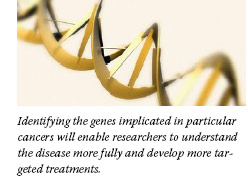
The Cancer Genome: An Important Project for a New Era
 Why do colon polyps in some patients never amount to more than a benign nodule, while in other patients they progress to a mortal threat? Why do two patients with the "same" type and stage of breast cancer respond so differently to the same treatment? The answers lie in gaining a deeper understanding of the genetic differences between cancer types. Working with the National Human Genome Research Institute (NHGRI), NCI hopes to undertake a project to characterize the human cancer genome, which we believe will allow us to gain such an understanding and much more.
Why do colon polyps in some patients never amount to more than a benign nodule, while in other patients they progress to a mortal threat? Why do two patients with the "same" type and stage of breast cancer respond so differently to the same treatment? The answers lie in gaining a deeper understanding of the genetic differences between cancer types. Working with the National Human Genome Research Institute (NHGRI), NCI hopes to undertake a project to characterize the human cancer genome, which we believe will allow us to gain such an understanding and much more.
Although we know more about the molecular basis of many cancers than we did just 5 years ago, the heterogeneity of these approximately 200 diseases has precluded a comprehensive understanding of the genetic aberrations that fuel them. A more systematic understanding could elucidate the cellular pathways that spur cancer cell growth and enable their spread throughout the body. This information, in turn, will provide a catalog of therapeutic targets and allow clinical trials to focus on patients who are most likely to respond to an agent based on knowledge of patients' tumor genetics. And these are just some of the expected benefits.
Embarking upon such an ambitious venture requires significant planning and discussion. As such, we're taking a phased approach to ensure that the appropriate systems, technologies, and processes for success can and will be developed, and to confirm that we can generate the sort of data and insights we expect.
The project began last week with a 3-day workshop involving some of the world's leading experts in areas such as cancer genomics, bioinformatics, microarray and proteomic technologies, and bioethics, as well as members of the advocacy community. Participants discussed issues with the aim of identifying the best approaches to characterizing the cancer genome - ones that will first be tested in a 3-year pilot. Plans for a pilot would have to be approved by key NCI and NHGRI advisory boards.
One focus of the pilot would be technology development. Although the Human Genome Project, in addition to providing the baseline catalog of human DNA sequences, resulted in tremendous advances in sequencing and other technologies, additional improvements are required to ensure that a project of this scale can be completed at an acceptable cost within a reasonable time frame. For example, informatics needs will include systems for managing the collection, integration, storage, and dissemination of tissue samples, and the clinical and genomic data associated with them. And new analytical tools will be needed to integrate and interpret experimental data on genomic alterations.
The development of such technologies would be integrated into other components of NCI's advanced technologies portfolio. Because the project would involve the collection of patient tissue samples, for example, it would enhance NCI's efforts to build stronger biorepositories.
At its heart, this project is about a vision to better understand and change the face of cancer. With proper planning and reliance on the wealth of intellectual talent available in the global biomedical research community, I believe the cancer genome project could fundamentally alter patient treatment by speeding the arrival of truly individualized molecular oncology.
Dr. Andrew C. von Eschenbach
Director, National Cancer Institute
|